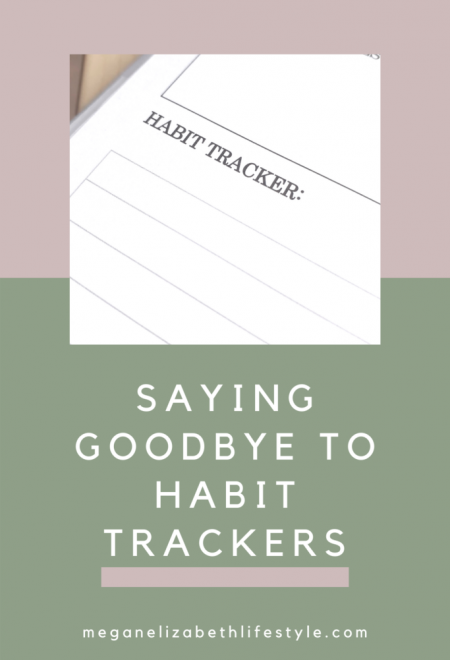Why I'm Saying Goodbye to Habit Trackers

In the world of goal setting and productivity, habit tracking is a valuable tool to implement into your life. I understand why too. Habit trackers are useful for introducing positive habits into your daily life. They can keep you accountable, and you can learn what is serving you and what isn’t in your lifestyle. Along with an increase in popularity in bullet journaling and planning, habit trackers appear left, right, and centre, it seems.
But are there times when habit trackers start to have a negative impact?
For me, that was the case, which led to a decision to bid farewell to habit tracking.
Habit trackers are good for getting started
My habit tracking has always been somewhat sporadic. They were never a regular feature of my bullet journal setups. Even when I did create a tracking setup, I never stuck to it.
Come the end of 2020 and start of 2021 though, I felt the need to develop a better routine. I wanted to incorporate daily wellbeing strategies to cope with lockdown days more effectively, as well as manage my time more now that I am working.
When I decided to do Yoga with Adriene’s 30 day yoga journey, having a habit tracker was helpful to keep up with the daily practices.
From there, I started to add other things to the list. Journaling, meditation, reading, exercise, as well as business tasks such as updating my social media.
For a short time, keeping a habit tracker was beneficial. It helped me to introduce more wellbeing tools into my everyday routine, and maintain them as a regular part of my daily lifestyle.
I think habit trackers are good for when you want to add something regularly into life.
Adding unnecessary pressure and losing the enjoyment
After habit tracking for a few weeks, including activities such as yoga, journaling, and exercise naturally became part of my everyday. They were things I wanted to do regularly, and felt the benefit from.
Habit tracker success! Or not as it turned out.
As time went by, I was aware that there were days when my mind and body weren’t in a position to go for a long walk, or read a book.
When you have a chronic illness, how you feel can fluctuate daily, or even hourly.
There were days when I felt really tired or my head wasn’t in a place to focus on anything.
But because I had this habit tracker of daily things I needed to, I felt pressured to keep going.
I was forcing myself to complete this list of habits everyday in order to tick them off on my tracker, rather than doing things which felt right for me on that day.
It made activities such as yoga and journaling – which I love and do actually like to do everyday – a task, rather than something which I did for me and my wellbeing.
This is when the negative impact of habit tracking got too much. I didn’t want my daily routine to be dictated by a list in my planner. It was causing so much unnecessary stress.
Yes, I make to-do lists for work purposes, but when it comes to self-care and looking after your mind and body, these should be areas which are done for you based on how you are feeling in the moment.
Have a toolkit that you can select from, rather than a forced to-do list
Getting rid of the habit tracker didn’t mean that I wasn’t going to completely stop my daily wellbeing practice.
Far from that.
Giving time to yourself is so important, and it’s those moments of relaxation, fresh air, reflection, stretching, whatever it may be, that help to keep my mind in check. I value my daily self-care so much.
Through habit tracking and my own wellbeing journey, I knew which wellbeing practices were beneficial to me, and which I enjoyed to most.
Rather than putting all of those into a must-do daily list though, I now keep a toolkit with all of my self-care techniques in.
Depending on how I’m feeling and what my health is doing, I choose as many or as little of these tools to include in my life each day.
If having a workout session on the exercise bike is what my body wanting to do, then great. If there’s a day when all I want to do is a quiet and gentle meditation session, then that’s also fine. One is no less valuable than the other.
What are your thoughts on habit trackers? Do they help you or stress you out?
What do I put into a wellbeing toolkit?
If you are at the beginning of your wellbeing journey or are simple looking for a wellbeing inspiration, I’ve put together a toolkit full of my favourite wellbeing practices, along with some information on why they are beneficial. You can try out these ideas to see if they could become part of your toolkit.
You will receive your copy, along with access to the Mindful Journal newsletter.





